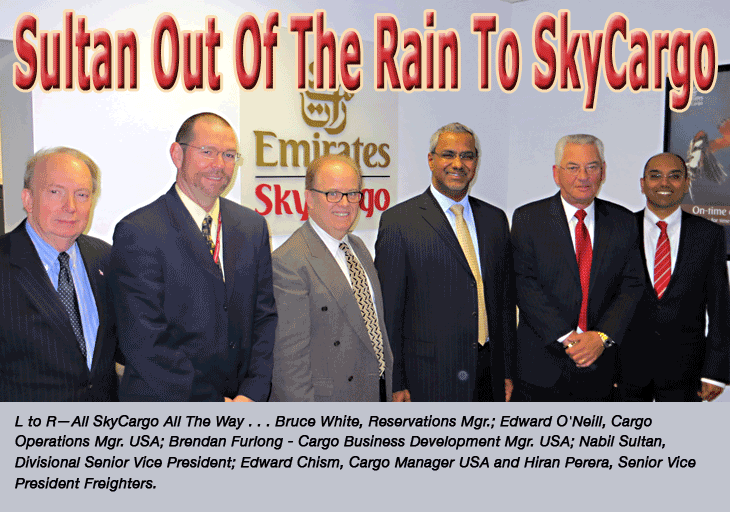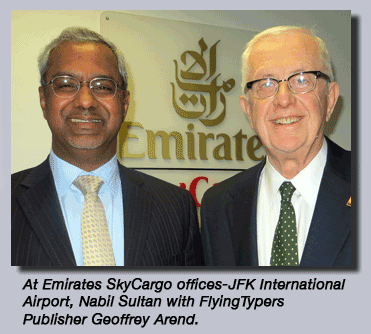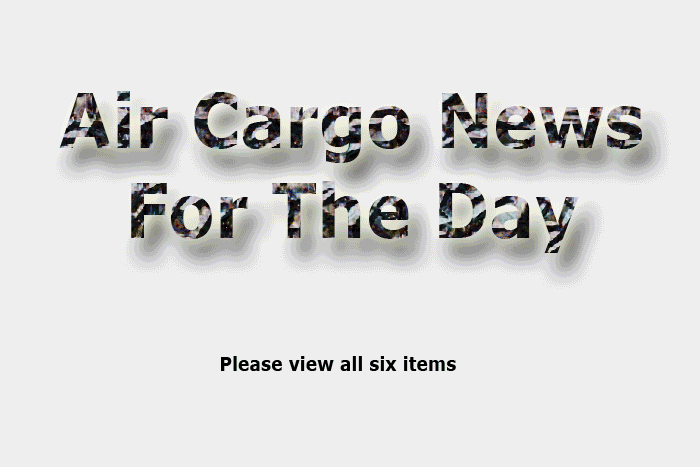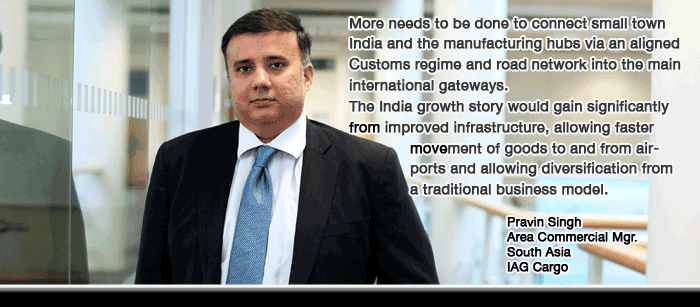
  abil
Sultan, Emirates Divisional Senior Vice President Cargo, walks into the
meeting room atop the carrier’s busy hub at John F. Kennedy Airport
in New York. abil
Sultan, Emirates Divisional Senior Vice President Cargo, walks into the
meeting room atop the carrier’s busy hub at John F. Kennedy Airport
in New York.
The place is neat, organized, and with everything in place; there are
no loose ends.
Emirates, which apparently rules the sky,
also casts its spell down on the ground in its air cargo transfer facilities.
They are precise, busy, and well organized. Even the coffee break room
has six different flavor choices for the morning break.
It is a mid-Autumn day, bright and blustery,
and Mr. Sultan—who is tall and distinguished—gives us an hour
in between customer calls and a jam-packed whirlwind visit to Gotham,
a key Emirates address.
It has been just five months since Ram Menen
put down his sword and retired, and the first words on record from Nabil
Sultan are thanks “for what Ram built and the amazing team spirit
at SkyCargo.”
Nabil is the new face of leadership at SkyCargo.
Born in Dubai, and educated in Dubai and
the United States, Nabil holds a Bachelor of Computer Science and Management
Information Systems from the University of Portland, Oregon.
Nabil smiles and admits loving “every
day it rained in Portland after a life in the desert.”
Nabil Sultan looks comfortable in his clothes
and apparently is enjoying the ride of his life.
That said, Mr. Sultan, who is bright, in
touch, with slightly graying hair and a straight and level gaze, leaves
no doubt when he says softly:
“Now we will carry things further.”

“I was immediately aware and surprised
at the overwhelming amount of paper it takes to move air cargo.
“Especially coming out of the passenger
end of the business, where the migration from paper has been swift and
complete in many aspects of that business.
“No doubt the complexity of the air
cargo industry can only be better served by streamlining processes, taking
cost out, and adding value for the customer.
“But much can be realized by making
every effort toward a paperless environment.
“Of course I learned at several smaller
stations coming up in this business, in many respects when it comes to
change and dealing with government agencies and bureaucracy, we still
have a long way to go.
“My take is that we have to change
the cargo mindset with respect to paper.
“When that happens, the mountains
of documents will go away.”

“In many ways,” Mr. Sultan says,
“no matter how you approach it, Emirates is an inspiring airline.
“We offer the trading community a
very efficient global resource that constantly translates into direct
value to the customer.”
Although he is new to air cargo, Nabil knows
full well how to airline.
He began his career with Emirates in 1990
in the IT department, and three years later joined the company’s
management training program in the commercial department.
“I liked the IT end of the business
and knew IT full well, but simply prefer working with people.
“I was able to get into management
training at EK at the suggestion of a friend, and am forever grateful
that happened.”
Nabil notes that for most of his career
at the carrier, he has worked his way up, moving from post to post and
always accepting new challenges and more responsibilities in various management
and leadership roles, both within and outside the UAE.
Nabil has served as Senior Vice President
for Commercial Operations West Asia and Indian Ocean; Senior Vice President,
Commercial Operations Gulf, Middle East and Iran; and Senior Vice-President
Operations for Europe.
In 2009, Nabil was promoted to Divisional
Senior Vice President, Revenue Optimization and Distribution (Passenger)
for the carrier.
“Revenue optimization is a fascinating
endeavor and made even more so at Emirates.
“In fact, year to year as we added
destinations and aircraft, the activity and growth added up to creating
a whole new airline every 12 months.”

“I’m excited by the opportunity
to further develop and expand the cargo division, to go into uncharted
territory and deepen our presence in Latin America, Africa, northern Africa,
and elsewhere, building an ever expanding business.
“Emirates SkyCargo will continue to
grow our network, provide solid uplift, generate volume, and deliver the
best value for money available anywhere.”
Nabil Sultan is also interested in partnerships
and has especially been impressed by the cooperation that has developed
great results for Qantas and Emirates.
“The Qantas partnership is unique,
seamless, and has enhanced value for each of our airlines and for the
public as well.
“We enjoy domestic openings in Australia,
and Qantas has benefitted from our global system as well.
“I expect that based on our success
this activity will widen with others as time goes on.”

Although he expects to be on the road visiting
stations for some time, in addition to being out on the hustings, greeting
customers as well, Nabil Sultan is also gearing up for 2014; he predicts
it will be an exciting year for Emirates SkyCargo.
“We are migrating our freighter operations—and
increasingly our cargo business—to the new Dubai World Central International
Airport and will provide bonded road connections and dedicated interface
between all flights and DWC in May 2014.
“Already cargo companies are at DWC,
including forwarders, and other infrastructure is in place as volumes
continue to build via the UAE gateway.”
“Two weeks ago the passenger business
opened at the field with more to come as the gateway takes shape as an
LCC address.”
Asked which trade shows he is thinking about
for 2014, Mr. Sultan says:
“Intermodal South America in Sao Paulo
in 2014 holds the promise of drawing the spirited growing cargo business
in Latin America.
“From our vantage point, we will continue
to grow strength to strength and be in the center of the action, wherever
we fly,” says Nabil Sultan.
Geoffrey/Flossie
|








